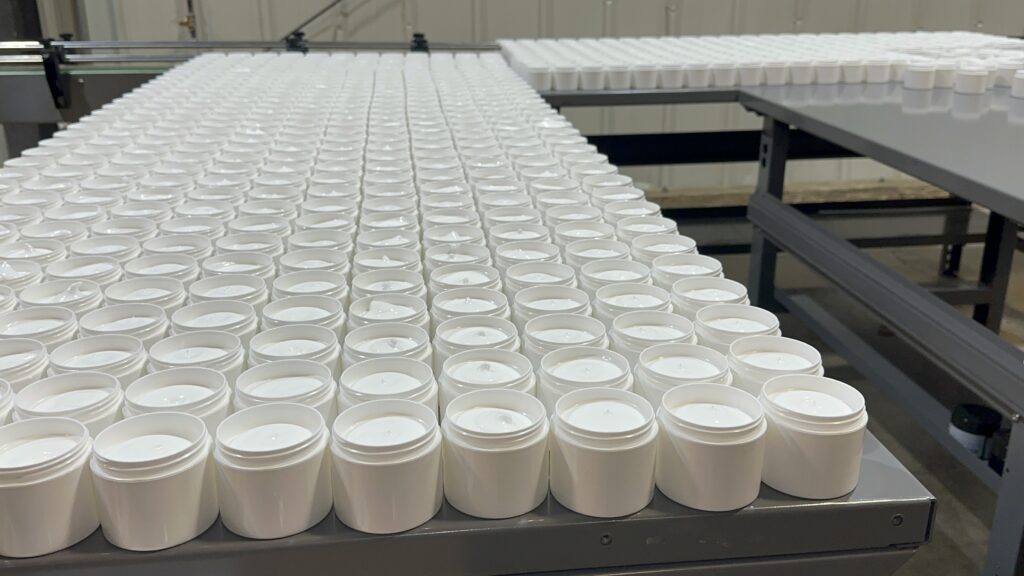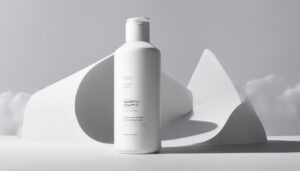
Skincare private label manufacturing is a booming industry, with the market for skincare products reaching almost $6 billion in 2019. When starting your own private label skincare business, it’s crucial to choose the right ingredients that will make your products stand out. In this section, we will explore the key ingredients to look for in skincare private label manufacturing to create game-changing solutions for your skin.
Key Takeaways:
- Skincare private label manufacturing is a lucrative industry with a market worth nearly $6 billion.
- Choosing the right ingredients can set your private label skincare products apart from the competition.
- Key ingredients to consider include squalane, trending ingredients like Bakuchiol, mushrooms, kombucha, and blue tansy.
- Finding your niche in the skincare private label market is essential for success.
- By focusing on your target market and incorporating market trends, you can create and market high-quality skincare products.
The Power of Squalane in Skincare
Squalane, a moisturizing ingredient, is a powerful addition to any skincare routine. This naturally-occurring oil has incredible benefits for the skin, making it a star ingredient in many anti-aging products. As we age, our body’s production of squalane decreases, leading to dry skin. However, using squalane topically can help to replenish and repair our skin cells.
One of the key benefits of squalane is its ability to deeply moisturize the skin. It forms a protective barrier that prevents moisture loss, keeping the skin hydrated and supple. This helps to improve skin elasticity and reduce the appearance of fine lines and wrinkles. Squalane also has a non-greasy texture, making it suitable for all skin types, including oily and acne-prone skin.
It’s important to note that not all squalane is created equal. Some squalane is sourced from sharks, which contributes to overfishing and endangers many species. To ensure sustainability, look for skincare private label manufacturing companies that use vegetable-based squalane derived from sources like olives. By choosing sustainable squalane, you can create skincare products that are not only effective but also environmentally friendly.
Table: Benefits of Squalane in Skincare
| Benefit | Description |
|---|---|
| Deep Hydration | Squalane moisturizes the skin and prevents moisture loss. |
| Anti-Aging | It helps reduce the appearance of fine lines and wrinkles. |
| Suitable for All Skin Types | Squalane has a non-greasy texture, making it suitable for all skin types. |
| Sustainability | Choose vegetable-based squalane to support sustainability and protect marine life. |
Incorporating squalane into your private label skincare products can elevate their performance and appeal to customers looking for effective and sustainable solutions. By harnessing the power of this moisturizing ingredient, you can create skincare formulations that deliver hydration, anti-aging benefits, and overall skin wellness.
Embracing Trending Ingredients in Skincare Private Label Manufacturing
Staying ahead of industry trends is key in the competitive world of private label skincare manufacturing. By incorporating trending ingredients into your products, you can create innovative formulations that appeal to customers seeking the latest skincare solutions. Let’s explore some of the trending ingredients for 2023 that can elevate your private label skincare line:
Bakuchiol
Bakuchiol is a natural alternative to retinol, known for its anti-aging properties. It helps reduce the appearance of fine lines and wrinkles, improve skin elasticity, and promote a more youthful complexion. With its gentle nature, Bakuchiol is suitable for all skin types, including sensitive skin.
Mushrooms
Mushrooms have gained popularity in skincare due to their numerous benefits. They are rich in antioxidants that help combat free radicals and protect the skin from environmental stressors. Additionally, mushrooms have hydrating and anti-inflammatory properties, making them ideal for soothing and replenishing the skin.
Kombucha
Kombucha, a fermented tea, has made its way into the skincare industry due to its exfoliating and protective effects. It contains natural acids that gently remove dead skin cells, revealing a brighter and smoother complexion. Kombucha also helps balance the skin’s pH levels and enhance its natural defense against external aggressors.
Blue Tansy
Blue tansy is an ingredient known for its ability to unclog pores and reduce redness, making it suitable for acne-prone and sensitive skin. It possesses anti-inflammatory properties, helping to calm and soothe irritated skin. Including blue tansy in your private label skincare formulations can promote a clearer, calmer complexion.
By embracing these trending ingredients, you can create skincare products that cater to the evolving needs and desires of your customers. Stay on top of industry trends and keep innovating to establish your brand as a leader in the private label skincare market.
| Trending Ingredients | Benefits |
|---|---|
| Bakuchiol | Anti-aging, improves skin elasticity |
| Mushrooms | Rich in antioxidants, hydrating, anti-inflammatory |
| Kombucha | Exfoliating, protective, balances pH levels |
| Blue Tansy | Unclogs pores, reduces redness, anti-inflammatory |
Finding Your Niche in the Skincare Private Label Market
Starting a skincare line can be an exciting and rewarding venture. However, with a highly competitive market, it’s essential to find your niche to stand out from the crowd and attract loyal customers. A niche market allows you to cater to a specific target audience and meet their unique needs and preferences. Here are some key factors to consider when finding your niche in the skincare private label market:
Identify Your Target Market
The first step in finding your niche is to identify your target market. Research and understand the demographics, preferences, and challenges of your potential customers. This will help you create products that specifically address their skincare concerns and provide tailored solutions. Whether it’s anti-aging, acne-prone, or sensitive skin, narrowing down your target market will allow you to develop products that resonate with your audience.
Research Market Trends
Stay abreast of the latest skincare trends and consumer preferences. Analyze market data and research to identify areas of opportunity. Look for gaps in the market where you can introduce unique, innovative products. Trends such as clean beauty, sustainable packaging, and customizable skincare are gaining traction. By aligning your private label skincare business with these trends, you can position yourself as a forward-thinking brand and capitalize on emerging market demands.
Focus on Your Passion and Expertise
When choosing a niche, it’s important to consider your passion and expertise. Building a skincare brand requires dedication and knowledge of the industry. Identify areas where you have a deep understanding and can create products that truly make a difference. Whether it’s natural skincare, organic ingredients, or specific skincare concerns, leveraging your passion and expertise will help you establish credibility and connect with your target market on a deeper level.
Table: Comparison of Niche Skincare Markets
| Niche Market | Target Audience | Unique Selling Point |
|---|---|---|
| Organic Skincare | Eco-conscious consumers | Natural, sustainable ingredients |
| Acne Solutions | Acne-prone individuals | Specialized formulas for acne treatment |
| Aging Gracefully | Mature individuals | Anti-aging solutions with proven results |
By finding your niche in the skincare private label market, you can create a brand that resonates with your target audience and sets you apart from the competition. Remember to stay true to your passion, research market trends, and understand your customers’ needs. With the right approach, your skincare line can thrive, attracting loyal customers who trust and love your products.
Conclusion
Starting a skincare business in the private label manufacturing industry can be a rewarding and profitable venture. By carefully selecting the right ingredients and staying on top of skincare trends, you can create innovative products that cater to the ever-evolving needs of consumers.
Remember, the key to success lies in finding your niche market. Take the time to research and identify the target audience that aligns with your brand values and product offerings. By understanding their preferences and desires, you can develop a strong and loyal customer base.
Additionally, don’t underestimate the power of effective marketing and sales channels. Building a strong brand presence through strategic marketing campaigns and utilizing the right platforms can significantly enhance your visibility and attract more customers to your skincare business.
As the skincare industry continues to evolve, staying informed about the latest trends and innovations will be crucial. Keep an eye on emerging ingredients and techniques that have proven results in skincare. By continuously adapting and improving your formulations, you can ensure that your private label skincare products remain competitive in the market.
FAQ
What should I look for in skincare private label manufacturing?
When choosing a skincare private label manufacturing company, it’s important to consider the ingredients they use. Look for companies that prioritize high-quality and effective ingredients that will make your products stand out in the market.
What is squalane and why is it important in skincare?
Squalane is a naturally-occurring oil that moisturizes and protects our skin cells. It is a star ingredient in many anti-aging products as it can repair cells, even skin tone, and reduce fine lines. When choosing squalane, opt for vegetable-based sources like olives to ensure sustainability and avoid the overfishing of sharks.
What are some trending ingredients I should consider in my private label skincare manufacturing?
Some trending ingredients for 2023 include Bakuchiol, which is a natural alternative to retinol, mushrooms known for their anti-aging properties, kombucha with its exfoliating and protective effects, and blue tansy that can clear congested pores and reduce redness. Incorporating these ingredients can help create innovative and sought-after products.
How important is finding a niche in the skincare private label market?
Finding your niche is crucial for success in the skincare private label market. By identifying a specific target market and catering to their needs, you can differentiate your products and attract loyal customers. Consider factors such as funding capital, target market profitability, and market data trends to determine your niche.
What is the key to success in the skincare private label manufacturing business?
The key to success in the skincare private label manufacturing business is a combination of choosing the right ingredients, staying ahead of industry trends, finding your niche, and building a strong brand presence through effective marketing and sales channels. By following these strategies, your business can thrive in the competitive skincare industry.





